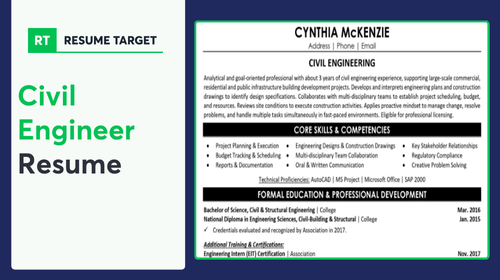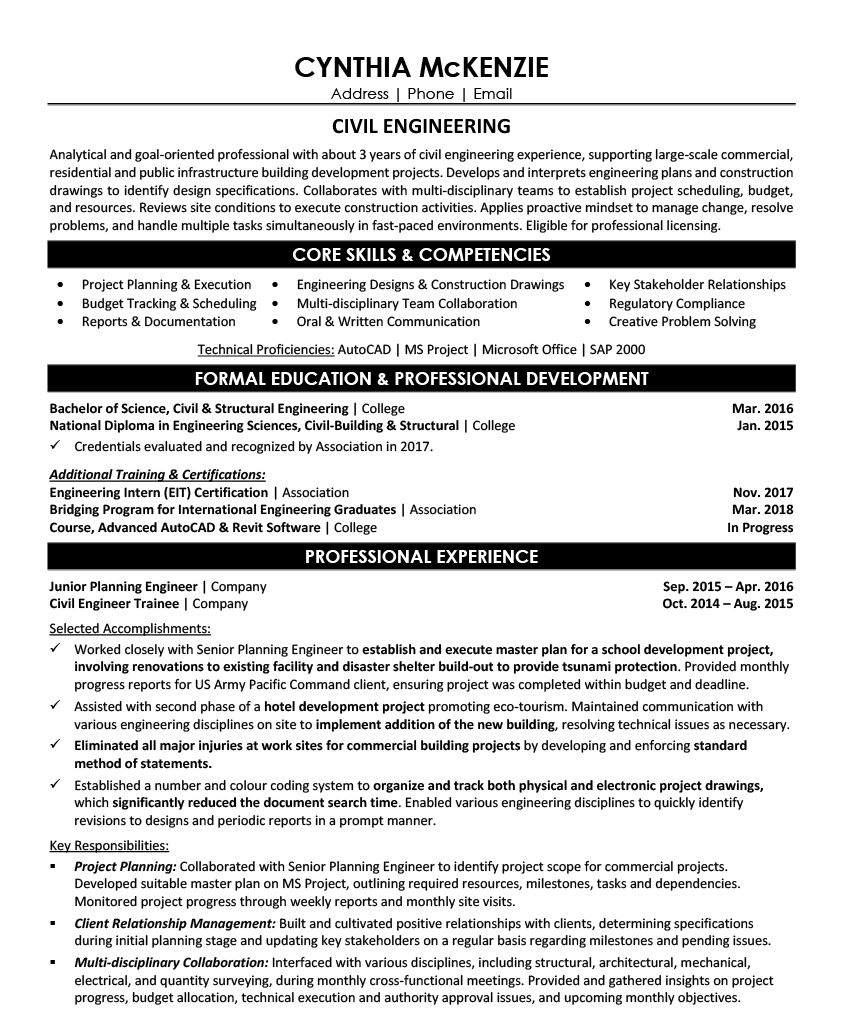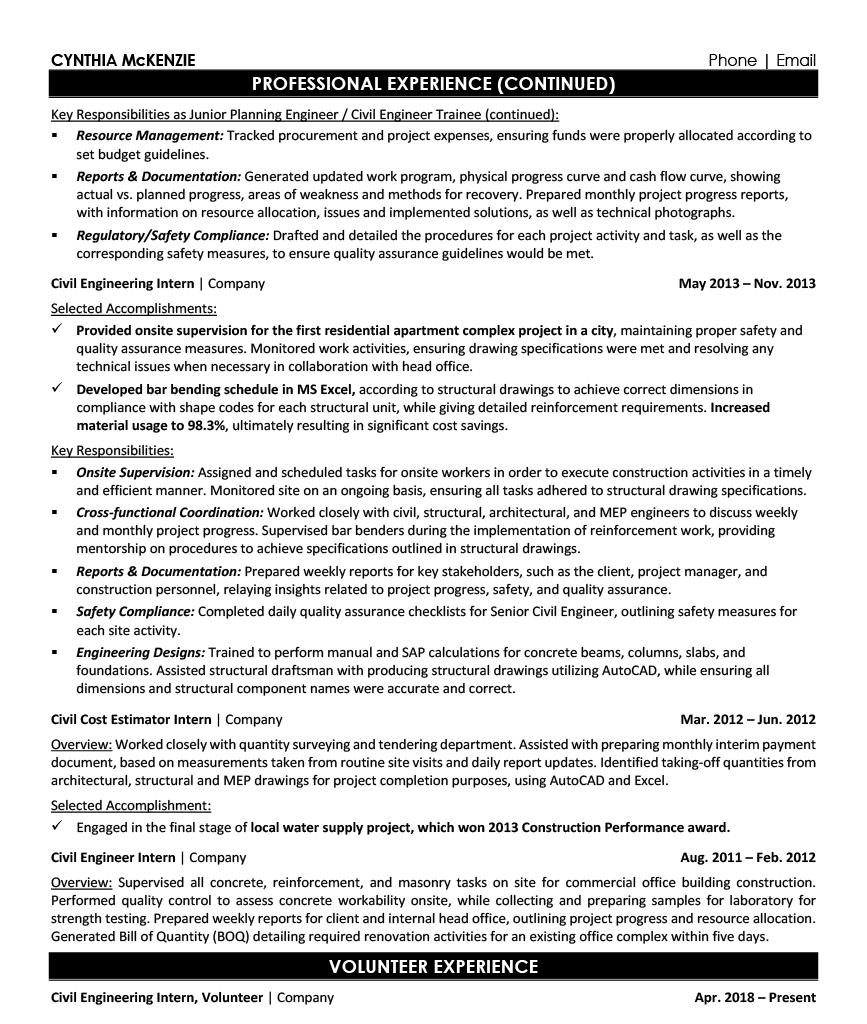

Technical specs and project details are easy - but turning complex engineering achievements into compelling resume content is a different challenge. Most civil engineers struggle to translate their technical work into clear business value.
Are you finding it difficult to showcase both your technical expertise and leadership abilities on paper? Your resume needs to bridge the gap between detailed engineering knowledge and the broader impact of your infrastructure projects.
Resume Target specializes in helping civil engineers transform project specifications into powerful career stories. We'll help you build a resume that speaks to both technical reviewers and executive decision-makers, positioning you for senior roles and high-impact projects.


As the masterminds behind our built environment, civil engineers transform empty spaces into the infrastructure that shapes modern life, from designing bridges and highways to developing water supply systems that millions rely on daily.
Using sophisticated computer-aided design (CAD) software and their deep understanding of physics and materials science, these professionals carefully balance safety, sustainability, and cost while bringing ambitious construction projects from blueprint to reality.
Whether you're fascinated by structural design or passionate about solving complex urban challenges, the civil engineering career path offers diverse specialization opportunities, from transportation systems to environmental engineering, with the potential to advance into senior project management or consulting roles.
Let's talk about what's exciting in the Civil Engineering field - your earning potential is impressive! As you build infrastructure and shape our communities, you'll find that your expertise is highly valued across various sectors, especially in architectural and engineering services where the rewards can be particularly attractive.
Figures from: U.S. Bureau of Labor Statistics
Civil engineering offers diverse paths to advance your career, from entry-level design work to executive leadership positions. Your journey can lead you through public agencies, private consulting, or construction management, with opportunities to specialize and grow.
Beyond basic engineering knowledge, advancing in your civil engineering career requires a strategic blend of technical expertise and leadership capabilities.
- Advanced structural analysis and design software proficiency - Project management and cost estimation expertise - Professional Engineer (PE) licensure - Team leadership and stakeholder communicationLaunch your civil engineering career by earning a bachelor's degree in civil engineering from an ABET-accredited program, which combines classroom learning with practical experience through internships and cooperative programs.
To excel in your civil engineering journey, you'll need to develop strong communication skills for explaining complex project details to various audiences, along with mastering technical expertise through hands-on experience.
Requirements from Teal HQ
From bustling coastal metros to growing inland cities, civil engineers find opportunities in both public and private sectors.
Figures from Nerdwerk
Here's what's exciting: Engineering services firms employ nearly half of all civil engineers, while government agencies at all levels combine to employ about 24% of the workforce. This mix of private and public sector opportunities means you can choose between different work environments and project types while building your career.Struggling to translate your complex engineering projects, technical skills, and construction management experience into a compelling civil engineer resume that stands out to hiring managers? This comprehensive, section-by-section guide will walk you through exactly how to showcase your engineering expertise and achievements in a professional resume format that gets results.
As a Civil Engineer, you know how to design complex infrastructure projects, but condensing your professional story into a few powerful lines can feel more challenging than calculating structural loads.
While you excel at transforming technical drawings into real-world solutions, capturing your expertise in a compelling summary requires translating those practical engineering skills into language that immediately shows hiring managers your value to their organization.
How would you describe your engineering philosophy and approach to infrastructure projects in terms of balancing safety, sustainability, and cost-effectiveness?
Reason: This helps establish your professional mindset and values upfront, showing potential employers how you tackle complex engineering challenges while addressing key industry priorities.
What types of civil engineering projects define your expertise, and how has your technical knowledge evolved across different infrastructure domains?
Reason: This question helps you articulate your broad technical foundation while highlighting your specialization areas, giving employers a clear picture of your professional scope.
How do you integrate modern engineering software and sustainable design practices into your work as a Civil Engineer?
Reason: This demonstrates your currency with contemporary engineering tools and methodologies, showing employers you're equipped to handle modern project demands and future industry developments.
As a civil engineer, you'll need to showcase both technical expertise in design and analysis alongside practical project management abilities that employers demand.
Your skills section should balance specialized engineering competencies like structural analysis and AutoCAD proficiency with essential soft skills such as team coordination and construction site management.
Showcase your engineering expertise by organizing your experience into three powerful sections: a concise role overview that sets the stage, quantifiable achievements that highlight your project successes, and core responsibilities that demonstrate your technical and leadership capabilities in infrastructure development.
Many Civil Engineers struggle to translate complex technical projects into clear, measurable accomplishments that resonate with hiring managers. Transform your structural innovations and infrastructure solutions into powerful metrics that showcase cost savings, efficiency improvements, and successful project completions under budget and ahead of schedule.
The responsibilities section demonstrates how Civil Engineers transform technical designs into real-world infrastructure solutions. This section must clearly show both technical expertise and project management abilities while connecting your daily work to successful project outcomes and organizational goals.
Your educational background and professional certifications are crucial proof points of your engineering expertise. Lead with your highest engineering degree and most relevant professional licenses, especially your PE license if you have one, then list any specialized certifications that demonstrate your technical capabilities in structural analysis, construction management, or sustainable design.
Now that you've built a strong foundation using Resume Target's comprehensive resume writing guidelines, you're ready to take your civil engineering resume to the next level.
While many candidates stop at crafting a general resume and customized cover letter, successful civil engineers know that personalizing their resume for each position is what truly sets them apart in this competitive field.
By strategically incorporating specific civil engineering keywords, technical skills, and project experience that match each job description, your resume will not only sail through ATS screening systems but will also immediately show hiring managers you're the ideal candidate for their structural, transportation, or environmental engineering projects.
Ready to transform your resume into a powerful tool that opens doors? Let's dive into making your civil engineering expertise shine for every application you submit!
Don't let a lack of professional experience hold you back from launching your Civil Engineering career! Your academic background, technical skills, and hands-on project work can create a compelling story that employers want to read.
Focus on highlighting your engineering coursework, design software proficiency, and any internships or capstone projects you've completed.
For a detailed roadmap to crafting your resume, check out the Student Resume Writing Guide to ensure you're showcasing your best qualifications.
Your civil engineering resume summary is your chance to showcase the perfect blend of technical education, design projects, and internship experiences that make you stand out.
Focus on highlighting your engineering fundamentals, software proficiencies, and any hands-on experience from academic projects or internships that demonstrate your readiness to contribute from day one.
"Detail-oriented and technically skilled Civil Engineering graduate with comprehensive academic training and internship experience in structural design and project management. Proficient in AutoCAD, Civil 3D, and STAAD Pro, with proven ability to assist in construction site coordination and structural analysis during university projects. Completed senior capstone project focusing on sustainable urban infrastructure design, earning department recognition. Seeking to leverage strong engineering foundation and collaborative mindset to contribute to innovative infrastructure projects as a Civil Engineer."
Now's your chance to showcase the rigorous academic foundation that prepared you for civil engineering success - turn those years of study into compelling content that catches employers' attention!
Don't just list your degree - highlight relevant coursework like "Structural Analysis"and impactful projects such as your senior capstone bridge design, focusing on technical skills and real-world applications that align with your target role.
Here are some courses common to a Civil Engineering degree/certification: 1. **Calculus I**: [1] 2. **Engineering Math**: [1] 3. **Statics**: [1] 4. **Fundamentals of Engineering**: [1] 5. **Graphics for Civil Engineering**: [1] 6. **Introduction to Infrastructure**: [1] 7. **Mechanics of Materials**: [1] 8. **Fluid Mechanics**: [1] 9. **Civil Engineering Materials**: [1] 10. **Introduction to Geomatics/Surveying**: [1] 11. **Construction Engineering & Management**: [1] 12. **Economics & Optimization**: [1] 13. **Structural Engineering Principles**: [1] 14. **Transportation Engineering and Analysis**: [1] 15. **Fundamentals of Environmental Engineering**: [1] 16. **Construction Management**: [2] 17. **Introduction to Engineering Mechanics**: [2] 18. **BIM Fundamentals for Engineers**: [2] 19. **Engineering Project Management**: [2] 20. **Design Basics of RCC Buildings**: [2] The civil engineering curriculum also includes coursework in mathematics and basic sciences, mechanics, materials, hydrology, structures, and transportation systems [3].Relevant Coursework: Structural Engineering Principles | Construction Engineering & Management | Mechanics of Materials | Transportation Engineering | BIM Fundamentals | Fluid Mechanics
Key Projects:
Urban Bridge Design Analysis: Developed comprehensive structural analysis and design for a pedestrian bridge connecting two university campuses, incorporating sustainable materials and ADA compliance requirements.
Sustainable Stormwater Management System: Collaborated with a four-person team to design an innovative urban drainage system for a residential development.
Leverage your academic training, internship experiences, and technical certifications by showcasing the precise civil engineering skills that employers seek, making your resume stand out in this competitive field.
As an entry-level Civil Engineer, your combination of technical knowledge and practical skills positions you well for roles in construction management, structural design, or infrastructure development, where demand continues to grow with urban expansion and infrastructure renewal projects.
When you're juggling complex infrastructure projects and technical specifications all day, finding the right words to showcase your engineering achievements can feel like designing a bridge without blueprints.
At Resume Target, we specialize in translating civil engineering expertise into powerful career documents that resonate with both technical reviewers and HR professionals.
Our team has helped countless civil engineers showcase everything from municipal project management to structural analysis skills, consistently landing interviews with top engineering firms.
With infrastructure spending at historic highs and competition fierce for the best positions, now is the perfect time to transform your resume into a powerful career tool - let's connect for a free consultation today.
Impress any hiring manager with our Engineering resume writing service. We work with all career levels and types of Engineering professionals.
Learn More → Engineering Resume Writing Services